What we do:
|
The community has been requesting our help to build a maternity ward on existing foundations at Kambale clinic. We are still in the process of securing funds with our other partners in this venture, but we hope to get it off the ground soon. |
Update April 2012: |
The Kambale maternity ward is racing ahead now – our partners, Zambeef and Chakanaka Farms have provided endless amounts of transport and use of their machinery for crushing stones and building bricks, and with our funds and the locals giving their labour for free (with a guaranteed lunch supplied by the clinic) – the building has grown at a pace.
A great piece of news is that another donor has agreed to buy an ambulance for Kambale Clinic, so those villagers living far away can get to the maternity ward in time! The Government has agreed to fund the fuel, maintenance and an ambulance driver. |
Update Sept 2011: |
On our recent visit to Chiawa, we saw firsthand one of the outreach clinics in action, and even helped with some pregnancy testing. We left the sensitisation and injections to the trained professionals though!
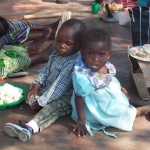 Local kids enjoying the food |
Update Feb 2011: |
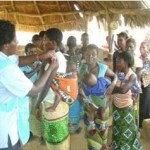 Outreach clinic 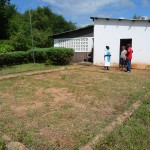 The existing foundations for the maternity ward at Kambale clinic We will work in a 3-way partnership with two local farm owners – they are keen for such a Maternity Ward as it’s often them who act as “ambulances” making that 60km dash to hospital! |
Update July 2010: |
The uptake of the family planning services continues to be a roaring success. Many women in the main villages have now been “sensitised” (ie have come to the clinics for open sessions to be told about the options available to them). Many have opted for the Jadelle implant – 2 small rods that are implanted invisibly into the arm, and provide contraception for 5 years. This is the first time that Marie Stopes has reached the rural areas in Zambia – to them, the project has been a “pioneering” venture to see how their services would be received in such rural areas – they have also been astonished at the success of it, and consequently are considering such programmes in other rural parts of Zambia – so our initial project may actually end up helping many more women than we’ll ever know!In Chiawa, the trained clinic staff and health workers are continuing with their Outreach Programmes, to try to reach even more rural communities in the area. |
Update Feb 2010: |
To date this has been very enthusiastically received, with 512 women choosing to start to use family planning methods (219 from Chiawa, and 293 from Kambale). MSI also trained the health centre staff in the procedures for requesting family planning supplies from the Government, resulting in the provision of such supplies improving greatly. |
|
Giving the opportunity for a better life |
|
|
|
Copyright © 2025 Zambezi Trust - All Rights Reserved |

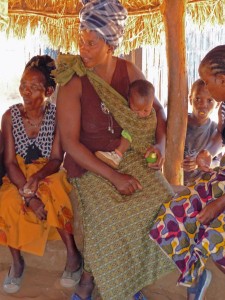 The Trust will be working in conjunction with Marie Stopes International to improve family planning and reproductive health services in the area. This will include raising awareness of STDs and HIV/AIDs. This will be based at two health centres, Chiawa and Kambale, and will also have an outreach programme, ensuring many women in outlying villages are reached by the healthcare workers. We will be funding the training of the existing clinic nurses/midwives as well as the community health workers, and the bicycles they need to reach the villages. Reproductive health is extremely important, ensuring safe sex is practised, and giving every person the freedom to choose if and when to have children – thus limiting the strain of supporting large families in such difficult circumstances.
The Trust will be working in conjunction with Marie Stopes International to improve family planning and reproductive health services in the area. This will include raising awareness of STDs and HIV/AIDs. This will be based at two health centres, Chiawa and Kambale, and will also have an outreach programme, ensuring many women in outlying villages are reached by the healthcare workers. We will be funding the training of the existing clinic nurses/midwives as well as the community health workers, and the bicycles they need to reach the villages. Reproductive health is extremely important, ensuring safe sex is practised, and giving every person the freedom to choose if and when to have children – thus limiting the strain of supporting large families in such difficult circumstances.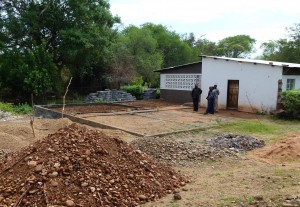
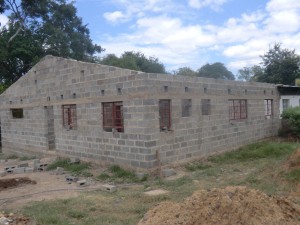
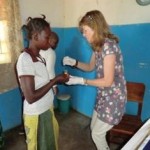
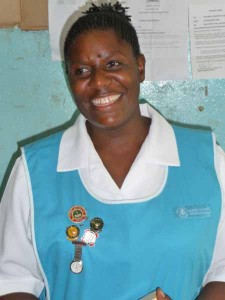
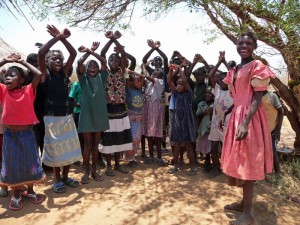 19 community health workers have been trained by MSI, to establish family planning support in the 2 health centres and communities. Also how to take care of the equipment they have received (autoclaves and examination couches). 3 health workers were trained in IUD insertion and implants, and 10 women were successfully given these on the first day.
19 community health workers have been trained by MSI, to establish family planning support in the 2 health centres and communities. Also how to take care of the equipment they have received (autoclaves and examination couches). 3 health workers were trained in IUD insertion and implants, and 10 women were successfully given these on the first day.